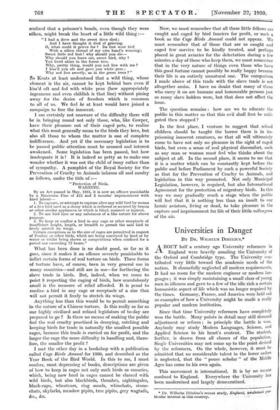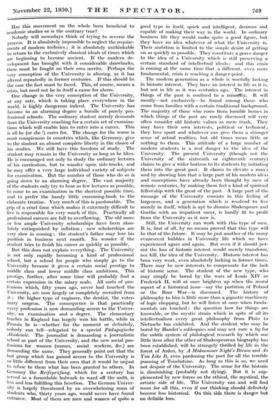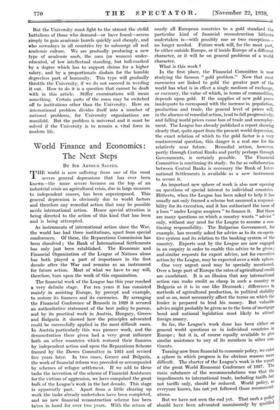Universities in Danger
BY DR. WILIIELM DIBELIUS.* ABOUT half a century ago Uniyersity reformers in England were heavily assailing the. University of the Oxford and Cambridge type. The University con- tributed very little toward the academic needs of the nation. It shamefully neglected all modern requirements. It had no room for the modem engineer or modern lan- guages ; it was simply maintaining a small class of young men in idleness and gave to a few of the idle rich a certain humanistic aspect of life which was no longer required by the times. Germany, France, and America were held out as examples of how a University might be made a really popular and modern institution.
Since that time University reformers have completely won the battle. Many points in detail may still demand adjustment or reform ; in principle the battle is won. Anybody may study Modern Languages, Science, and Applied Science to his heart's content. The student, further, is drawn from all classes of the. population. Single Universities may not come up to the point desired by the reformers. On the whole, however, it must be admitted that no considerable talent in the lower orders is neglected, that the " poure scholar " of the Middle Ages has come to his own again.
This movement is international. It is by no means confined to England. Everywhere the University has been modernized and largely 'democratized.
• Dr. Wilhelm Dibelius's'recent study, England, ;awakened P"'
titular interest in-this country. - •• • - Has this movement on the whole been beneficial to academic studies or is the contrary true?
Nobody will nowadays think of trying to reverse the process. It is absolutely impossible to neglect the require- ments of modern technics ; it is absolutely unthinkable to return to the exclusively classical ideals of times which are beginning to become ancient. If the modern de- velopment has brought with it considerable drawbacks, these must be fought on their own merits. Perhaps the very conception of the University is altering, as it has altered repeatedly in former centuries. If this should be the case the fact must be faced. This, of course, means a crisis, but need not be in itself a cause for alarm.
One change in the very conception of the University, at any rate, which is taking place everywhere in the world, is highly dangerous indeed. The University has become to an alarming degree a bundle of purely pro- fessional schools. The ordinary student merely demands from the University coaching for a certain set of examina- tions which will enable him to enter into a career. This is all he (or she !) cares for. The change for the worse is most conspicuous in countries which, like Germany, give to the student an almost complete liberty in the choice of his studies. We still have this freedom of study. The student may remain in the University as long as he likes. He is encouraged not only to study the ordinary lectures of his curriculum, but to wander upon side-tracks, and he may offer a very large individual variety of subjects for examination. But the number of those who do so is going down to an alarming degree. The vast majority of the students only try to hear as few lectures as possible, to come to an examination in the shortest possible time, and to prefer the handy little cramming-book to the elaborate treatise. Very much of this is pardonable. The grip of a cruel time which makes it extremely difficult to live is responsible for very much of this. Practically all professional careers are full to overflowing. The old more or less ample University scholarships have been abso- lutely extinguished by inflation ; new scholarships are very slow in coming ; the student's father may lose his position in business next month. No wonder if the student tries to finish his career as quickly as possible.
But this does not explain everything. The University is not only rapidly becoming a kind of professional school, but a school for people who simply go to the University because it gives a certain social prestige to middle class and lower middle class ambitions. This prestige, further, after some time will probably find a certain expression in the salary scale. All sorts of pro- fessions which, fifty years ago, never had touched the University, are now largely or completely recruited from it : the higher type of engineer, the dentist, the veter- inary surgeon. The consequence is that practically every profession is now demanding access to the Univer- sity, an examination and a degree. The elementary teacher in England has largely won his battle, while in Prussia he is—whether for the moment or definitely, nobody can tell—relegated to a special Pddagogisehe Akademie. The journalist is demanding a journalistic school as part of the University, and the new social pro- fessions for women (nurses, social workers, &c.) are demanding the same. They generally point out that the last group which has gained access to the University is so little different from their own that it would be unjust to refuse to them what has been granted to others. In Germany the Reifeprufung, which for a century has served as a formidable bulwark to ward off the unfit, is less and less fulfilling this function. The German Univer- sity is largely threatened by an overwhelming mass of students who, thirty years ago, would never have found entrance. Most of them are men and women of quite a
good type in itself, quick and intelligent, desirous and capable of making their way in the world. In ordinary business life they would make quite a good figure, but they have no idea whatever of what the University is. Their ambition is limited to the simple desire of getting on as quickly as possible. They constitute a grave danger to the idea of a University which is still preserving a certain standard of intellectual ideals ; and this crisis is coming at the same time that a different, even more fundamental, crisis is reaching a danger-point.
The modern generation as a whole is woefully lacking in historic interest. They have an interest in life as it is, but not in life as it was centuries ago. The interest in things of the past is confined to a minority. It will mostly—not exclusively—be found among those who come from families with a certain traditional background. The majority of those who come from humble homes in which things of the past are rarely discussed will very often consider old historic values as mere trash. They may have their own interests, political or technical ; they love sport and whatever can give them a stronger sense of actual realities, but old times mean little or nothing to them. This attitude of a large number of modern students is a real danger to the idea of the University. The present University (though not the University of the sixteenth or eighteenth century) claims to give a wider horizon to its students by initiating them into the great past. It claims to elevate a man's soul by showing him that a large part of his modern ideas and conceptions have already been thought by men of remote centuries, by making them feel a kind of spiritual fellowship with the great of the past. A large part of the message of the University consists in this feeling of largeness, and a generation which is resolved to live merely in itself, which is apt to dismiss Shakespeare and Goethe with an impatient sneer, is hardly fit to profit from the University as it now is.
Still, the University can work with this type of men. It is, first of all, by no means proved that this type will be that of the future. It may be just another of the many evanescent bubbles in University life which we have experienced again and again. But even if it should per- sist the loss of historic interest would merely transform, not kill, the idea of the University. Historic interest has been very weak, even absolutely lacking in former times. There may be new interests to compensate for the lack of historic sense. The student of the new type, who may simply be bored by the wars of Louis XIV or Frederick II, will at once brighten up when the moral aspect of a historical issue—say the partition of Poland or the Boer War—is discussed. The history of philosophy to him is little more than a gigantic machinery of logic chopping, but he will listen at once when funda- mentals are touched : the question how far things are knowable, or the mystic strain which in spite of all its intellectualism every great philosophy from Plato to . Nietzsche has exhibited. And the student who may be bored by Hamlet's soliloquies and may not care a fig for the subtle system of philological research by which one little item after the other of Shakespearean biography has been established, will be strangely thrilled by life in the forest of Arden, by A Midsummer Night's Dream and As You Like It, even pardoning the poet for all the terrible punning of Touchstone. As long as this is so, we need not despair of the University. The sense for the historic is diminishing (probably not dying). But it is sup- plemented by new forces on the ethical, the mystical, the artistic side of life. The University can and will find room for all this, even if our thinking should definitely become less historical. On this side there is danger but no definite loss.
But the University must fight to the utmost the stolid battalions of those who demand—or have found—access simply to gain academic laurels quickly and cheaply, and who nowadays in all countries try to submerge all real academic culture. We are gradually producing a new type of academic snob, the men (or women) under- educated, of low intellectual standing, but hall-marked by a degree which has to support claims for a higher salary, and by a proportionate disdain for the humble degreeless part of humanity. This type will gradually throttle the University, if we do not succeed in weeding it out. How to do it is a question that cannot be dealt with in this article. Stiffer examinations will mean something. Certain parts of the mass may be switched off to institutions other than the University. Here an international problem divides itself into a number of national problems, for University organizations are manifold. But the problem is universal and it must be solved if the University is to remain a vital force in modern life.




















































































 Previous page
Previous page